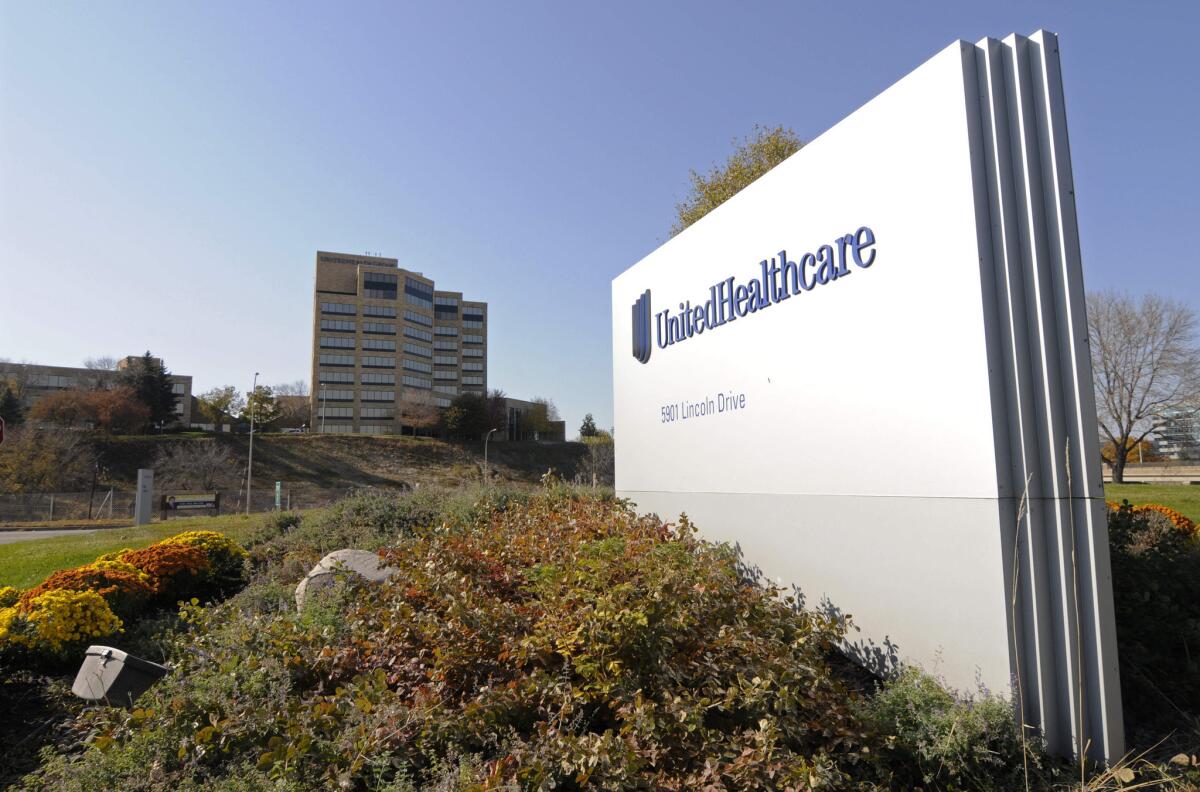Nation’s largest health insurer to quit some Obamacare markets

UnitedHealth Group Inc.’s campus in Minnetonka, Minn. The company will be exiting some Obamacare marketplaces in 2016.
- Share via
Reporting from Washington — UnitedHealth Group, the nation’s largest health insurer, announced Tuesday that it would stop selling health plans through the Affordable Care Act next year in most of the 34 of states where it operates.
The move, widely expected for months, will likely have relatively little effect on what most consumers pay for health coverage, as other insurers have out-competed UnitedHealth in the marketplaces created by the 2010 health law.
Nor will the decision seriously threaten UnitedHealth, as the marketplaces are a small fraction of the insurance giant’s overall business, which includes providing coverage to millions of people who get health benefits through an employer.
SIGN UP for the free California Inc. business newsletter >>
But UnitedHealth’s exit may leave some of the roughly 12 million Americans who rely on the marketplaces with fewer insurance choices next year. The announcement also underscores how challenging implementation of the complex health law remains, even three years after the marketplaces debuted.
UnitedHealth warned in November that it was having trouble with its marketplace business, noting that its customers were sicker than expected, leading to higher medical claims.
The company already announced it was pulling out of several states, including Arkansas and Michigan.
Speaking on an otherwise upbeat call with investors Tuesday, CEO Stephen Hemsley said UnitedHealth would remain in “only a handful of states” in 2017, though he did not specify which.
“Our own experience and performance have been unfavorable in these markets. The smaller overall market size, and shorter-term, higher-risk profile within this market segment continue to suggest we cannot broadly serve it on an effective and sustained basis,” he explained.
Several other insurers, including state Blue Cross Blue Shield plans, have reported similar challenges in recent months.
And more than a dozen nonprofit insurance co-ops created through the law have shuttered, as they were overwhelmed by medical claims they couldn’t afford.
But other insurers, including California-based Kaiser Permanente and Indiana-based Anthem, another major player in the California market, have been more bullish on the new marketplaces.
And in February, Covered California Executive Director Pete Lee blasted UnitedHealth for blaming the health law for its own missteps, noting in an interview with Kaiser Health News that the company had poorly designed and priced its health plans.
Ben Wakana, a spokesman for the U.S. Department of Health and Human Services, downplayed UnitedHealth’s move.
“As with any new market, we expect changes and adjustments in the early years with issuers both entering and exiting states,” he said. “The marketplace is a reliable source of coverage for millions of Americans with a robust number of plan choices. We have full confidence, based on data, that the marketplaces will continue to thrive for years ahead.”
Thus far, the law has helped some 20 million previously uninsured Americans get coverage, mostly through the marketplaces and through expansions to state Medicaid programs also made possible by the law. (Some of the people on marketplace plans were previously insured.)
How many people will ultimately be affected by UnitedHealth’s move remains unclear.
But a recent analysis by the nonprofit Kaiser Family Foundation suggests that even if the company exited all 34 states – which it does not plan to do – nearly three-quarters of marketplace enrollees would still be able to choose from at least three insurers.
And foundation Senior Vice President Larry Levitt said that while some consumers will have fewer options, “nationally, it will be a blip.”
The law allows Americans who don’t get health benefits at work to shop among plans on state-based marketplaces operated by the federal government or by the states themselves.
Consumers making less than four times the federal poverty level – about $47,000 for a single adult or $97,000 for a family of four – qualify for subsidies. Insurers must provide a basic set of benefits and cannot turn away consumers, even if they are sick.
Those who don’t have coverage or qualify for an exemption face fines this year of $695 per adult and $347.50 per child, or 2.5% of family income, whichever is larger.
Follow @noamlevey on Twitter
ALSO
Why sporting goods retailers are fumbling
Blood-testing firm Theranos faces investigations by the Justice Department and SEC
High court ruling is bad news for California taxpayers fleeing to Nevada for lower rates
More to Read
Inside the business of entertainment
The Wide Shot brings you news, analysis and insights on everything from streaming wars to production — and what it all means for the future.
You may occasionally receive promotional content from the Los Angeles Times.











